After a turbulent year, Mady Morneault, Lauryn Ott and Anna Sweeney share their trials and triumphs.
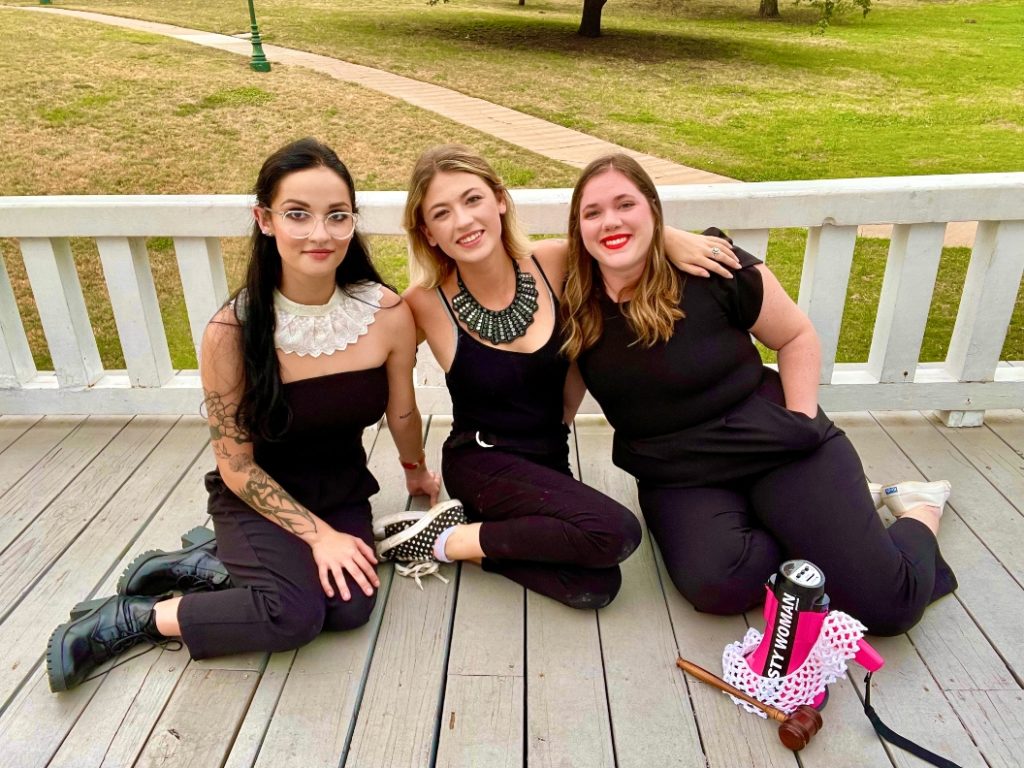
By Cy White
Let’s take a trip back to October 2020. The Honorable Ruth Bader Ginsberg has just passed. There’s a loud uproar over the Senate’s push to fill her seat before it’s even had a chance to cool. Women’s March branches all over the country rally behind their shero, protesting the Supreme Court’s disregard for tradition, precedent and Bader Ginsberg’s own wishes to wait to fill her seat until after the presidential election.
Mady Morneault, Lauryn Ott and Anna Sweeney weren’t new to activism. But co-hosting the local Women’s March was their first and biggest endeavor by far. The rally and the women organizing it gained valuable guidance from the national chapter of Women’s March, but they mostly undertook the planning and execution of the event with little help from other local organizations. When the rally first got underway, everything went smoothly. Sun shining, Taylor Swift playing in the background.
Attendees having fun. They were warned about possible pushback from certain groups and trained on how to deescalate volatile situations, but for all intents and purposes there was no cause for serious alarm.
Then the Proud Boys showed up. For the uninitiated, the Proud Boys are a right-wing white supremicist group of men who galavant about town in full tactical gear with loaded weapons to intimidate and threaten those who stand against their archaic and, quite frankly, deplorable ideologies about who does and doesn’t deserve to be treated like a human being. Cresting over a hill leading down toward the Wooldridge Square Park pavilion, they strode in. Shouting derogatory slurs toward the women. Mocking their efforts. At several points physically and verbally assaulting those in attendance.
The astonishing part of the whole situation, however, wasn’t even what happened that day. Disgusting? Yes. Traumatizing? Most certainly. But perhaps most harrowing: not a single person from the media even approached the young women about what they’d experienced. (If a tree falls in the forest and nobody’s around to hear it…)
A Year Passes
One year on, each woman has taken a divergent path to move past the events of last year. Ott is still apprehensive about being as proactive as she was. “I’m not running back to go marching again,” Ott reveals, a somewhat somber grin tugging at her lips. “I feel like we’ve been running a marathon in this pandemic. I’m exhausted.”
Even in her understandable exhaustion, she found the ability to stay active.
“Work has picked up,” Ott says. “I’m leading a number of different initiatives at work for women-owned businesses. So that’s really exciting. I got to travel a little bit safely, which was really nice. Funny enough,” she says with a smile, “I went to Florida, which is the worst place for COVID. We had planned it after vaccinations; there wasn’t a Delta variant. I was telling people, ‘I went to the worst state for COVID, and then I returned [to]the worst state for women.’ So now [I’m] trying to wrap up the year and excited to get some rest.”
Sweeney has experienced a number of transitions since last October, including graduating from Texas State in December with her bachelor’s. “I have been working in vet med actually,” she says. There’s a note of surprise in her own voice, considering she’d started working in the social work field after she graduated. “I eventually made the decision to switch to working in vet med. I’ve also been volunteering with Pug Rescue of Austin, fostering pugs.” The point is punctuated with the delighted yips of two pugs she’s fostering at the moment.
She even started a new job at a new animal hospital in Austin. In the midst of all of that, Sweeney still managed to participate in the Don’t Mess with Texas’ Abortions rally. She as well as dozens of other women donned the signature red cloaks from the somewhat prophetic television series The Handmaid’s Tale.
Wellness Milestones
Morneault has also stayed incredibly active. She returned to part-time work and continued volunteering with Planned Parenthood. She, too, participated in the Don’t Mess with Texas’ Abortions rally. “Just trying to keep myself busy with my writing and my advocacy,” she says. “I’ve been spending a lot of my time doing photoshoots and writing for my Instagram, @madymorneault. I also recently redesigned and revamped my website for all of my projects that I’ve done this year as a way of raising awareness for endometriosis, with Modibody and health.com. It’s called missmisdiagnosis.com, and it’s been really fun to see that take off.”
After suffering for most of her adult life from endometriosis, Morneault had what she hopes to be her final surgery to remove the rest of the scarring. “I made the decision to travel to the Center for Endometriosis Care in Atlanta, Georgia, for the surgery,” she says brightly. “Recovering from that was a huge part of my life that I’ve been waiting on for a long time. It was extremely successful, and they gave me a rate of only 5% possible rate of recurrence, which is the best-case scenario you can get. It’s a huge blessing for sure.”
Ott recently celebrated her own astounding wellness feat. “I celebrated five years of being cancer-free in July.”
The announcement is subdued, but her smile is genuine. “I got my official five-year stamp. So I’ve been downgraded to a low risk of occurrence.” Ott wears her emotions openly on her face. Just saying the words “five years cancer-free” has a profound effect on her each time they leave her mouth.
Senate Bill 8
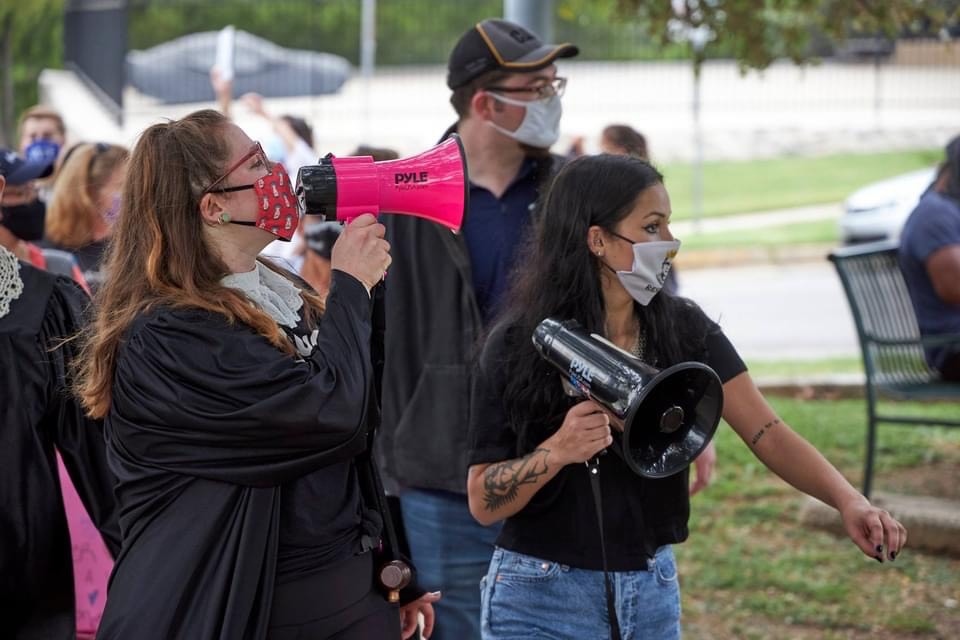
These women know firsthand what it means to live with trauma. The whole world is suffering from it collectively. There’s a pervasive feeling of unease that the next major catastrophe will be the one to ultimately bring humankind to its knees. But let’s bring things back down to earth. In September, the state of Texas passed 666 bills including Senate Bill 8, one of the most aggressive and direct challenges to Roe v. Wade in history. Gov. Abbott and his cabinet have sent a very clear message to the rest of the country, reinforcing a centuries-old practice of policing women’s bodies.
“I’m sure we all read what he said about victims of rape,” Sweeney says, then pauses. Her face a mask of barely concealed rage. “Disgusting,” she spits out. We live in an age where the entire country is actively—most times painfully—attempting to grapple with the more deplorable aspects of its history. The 666 bills passed in September was the proverbial middle finger to progress, accountability, equity and equality. (If you’re wary of the figure, according to the Texas Legislature Report on the State Capitol official website, yes, that is the actual number.)
It’s no wonder, then, that Ott has opted to temporarily step away from more hands-on activism. The fact that what they went through still affects them one year later speaks so viscerally to the seeming never-ending onslaught of tragedies plaguing the world. How does one stay sane?
The Healing Power of Therapy
“Therapy,” Ott says with a rueful chuckle. Her next words are more serious, “Limiting your news is helpful. You can scroll through Instagram and still see what’s happening. So I’m like, ‘Well, if I’m going to see it on my socials, I’m not going to go out of my way to watch CNN 24/7.’ It can take over and suffocate you. I’ve been reading a lot too,” she continues. “That helps me escape into a different world than this one. It’s been really helpful for me to give my brain and heart a break.”
“Therapy has been a huge part of my healing journey,” Morneault says. “Especially last year with the Women’s March and all the trauma that kind of ensued, I know I wouldn’t have been able to bring myself back into that advocacy space if I didn’t take care of myself first.”
She also believes in limiting her dependence on the news cycle. “During the pandemic when I was detached from everybody else, I used to have the news on constantly,” she recalls. “So for every time I check the news I try to have a moment of silence with myself. I love being out in nature, listening to the sounds of nature and just existing and plugging into that as opposed to what’s online and what’s in the news. I’m gonna feel the wind on my face, or the heat because it’s Texas, and reset.”
Rage Against the Machine
“I have been getting angry with what I’ve been seeing,” Sweeney admits. “With what’s been going on in Texas, I’m furious. And I think that’s okay. I think I have the right to be furious. Rights are literally being taken away, so I think everyone has the right to be furious. I was so disappointed with the response from the Supreme Court. I’m not surprised,” she says, “but I was hoping more preventative measures would’ve been taken before it got this far.”
The pause here is simmering with the sort of searing energy it takes to relieve feelings of blind rage. “At the same time, it kind of also drives me. I’m so ready for Nov. 8, 2022,” Sweeney says with conviction. “I’m going to go hard. I’m going to register everyone I know.”
Ott reflects on the grief each one of them felt last year. “This is why we were freaking out when [Bader Ginsberg] passed away,” she says emphatically. “We didn’t trust our system to protect us, and it didn’t. So there’s a lot of anger. When this passed we all texted each other and were like…” She lets out a heavy sigh, illustrating their collective grief. “I do feel that urge to do something. Marches are so great because it’s such a source of community. Sometimes it’s just good to be angry around people who are angry about the same thing.”
Anger Into Action
“My personal favorite thing about protesting is that it turns anger into power,” Morneault says. “That thing of being angry around people who are angry about the same thing you are, when you have that collective force, that anger turns into power. It turns into a voice, and it turns into a message.”
Grief. Fury. Rage. These emotions are valid and at times are useful to help motivate action. “Now it’s about what can I do?” Sweeny says. “I can’t go bribe a state legislator. I can’t control what’s being done in law. But I can at least try to get [people]to bring more awareness to the situation.”
Reflections on Women’s March: Lauryn Ott
Whether marching or speaking their truths, they have never lost the spirit and brass ovaries to speak up and speak loud about what needs to be fixed. This includes turning a much-needed critical eye toward the organization that started them on this journey: Women’s March. Many have noted the oftentimes contrarian behaviors of the organization.
The outrage over SB 8 is valid, but a large contingency can’t help but wonder where all this anger was when Black lives were being sacrificed to the gods of law enforcement. When the Black Lives Matter organization was in desperate need of support from like-minded organizations, where were they? When Women’s March held rallies for voting rights, the BLM presence was mysteriously absent. (Perhaps the invite got lost in the mail.) Similarly, where was this female fury after years of the murder of trans women?
“I can’t tell you what my relationship is with the Women’s March,” Ott says openly. “I know that’s not a happy answer. But I think it’s important that we hold people accountable. If you’re gonna claim that you are rallying around intersectional feminism, that means you help everyone. I struggle with that as far as my future participation.
“I am not interested in talking shit about anyone,” she continues. “At the same time I think it’s important to realize we sometimes don’t even have each other’s backs, and that’s something we really need to focus on. Especially white women. This is a problem we have in the feminist community,” she says with a small chuckle of frustration.
“We wanna support the shiny, popular things and not have those conversations with women of color and see what we can actually do, or step aside and create that platform for women of color. I think that’s what I’ve been struggling with. I did a march, and I’m proud of myself and I’m proud of us. We really pulled something together quickly and it was beautiful. But now it’s my turn to step aside and let someone else go. Whether that’s the next generation, whether that’s women of color, I’m happy to step aside and support.”
Reflections on Women’s March: Mady Morneault
Morneault offers another perspective. “I think it’s really important to recognize there are so many things that you can do other than marching,” she says. “I know there were times in my life where I wasn’t physically able to march or go to a rally or to just show up in person somewhere. One of the silver lining of the pandemic is that it’s proven how much we can do virtually. And I think that’s something we shouldn’t take for granted moving forward. You can volunteer at a text bank, you can call and write your Senators. I make a huge effort to make sure that the activism of whatever I’m involved in is not performative.”
Reflections on Women’s March: Anna Sweeney
Sweeney sees a need to focus attention on more than just the visible “women” aspect of Women’s March. “It’s important to remember that not everyone identifies as a woman,” she insists. “People can still get pregnant who are not women. There’s nonbinary people, there’s transgender people, and it’s affecting all of these people as well. I think it’s important to emphasize the equality part and less the gender identities.“
She makes the point clear: “It’s not feminism if it’s not intersectional,” she says. “I think a lot of people forget that.” As this active face of feminism, Women’s March can’t be one-sided.
True Sisterhood
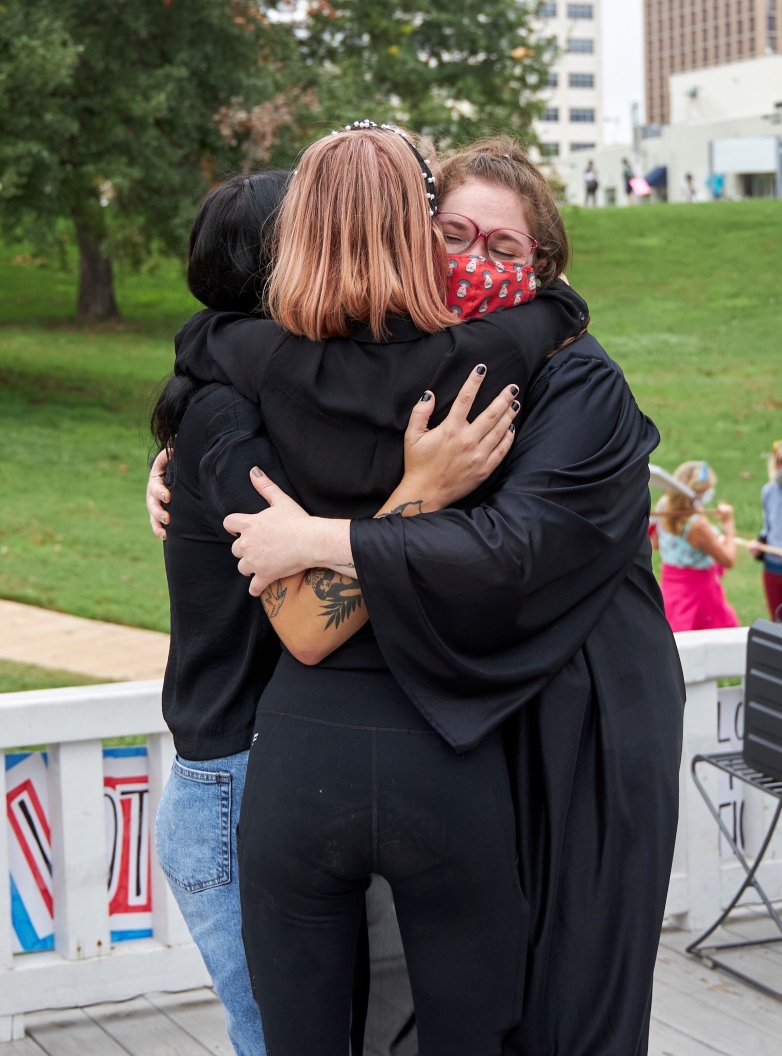
Through all of this, there’s one constant that’s held these women together. Their friendship.
“I know that our little text group that we have, we haven’t stopped since before the march,” Morneault says. “I tell people, ‘You don’t get how much I love these women.’ I have not gone a single day without talking with them. Not a single day was missed.”
The Zoom erupts with the kind of laughter heavy-laden with mutual adoration.
“We have multiple chat groups,” Ott says with enthusiasm. “We’re all on TikTok, so we’re always sending each other things. It’s family.” The self-proclaimed mom of the group radiates so much love when speaking about her sisters in spirit.
“Honestly, they’re my two closest friends,” Sweeney says. “I talk to them more than I talk to my roommate. They’re included in every big thing in my life. Any important decision I’m always like, ‘Guys, please help.’” More laughter. The mirth of true sisterhood.
Even through what seems like a never-ending cycle of catastrophes, we must remember we are never alone. There’s always someone in your corner who wants you to succeed. Mady Morneault, Lauryn Ott and Anna Sweeney have found sisters for life in one another, sharing a bond kept strong through a year of trials, triumphs, extreme pain and unimaginable joy. They were indeed “baptized by fire.”
Like the most powerful sword, their experiences in the last year have forged a lifelong friendship that nothing can chip or fracture. Despite the sound and the fury, they have each other.
What makes the other two women survivors?
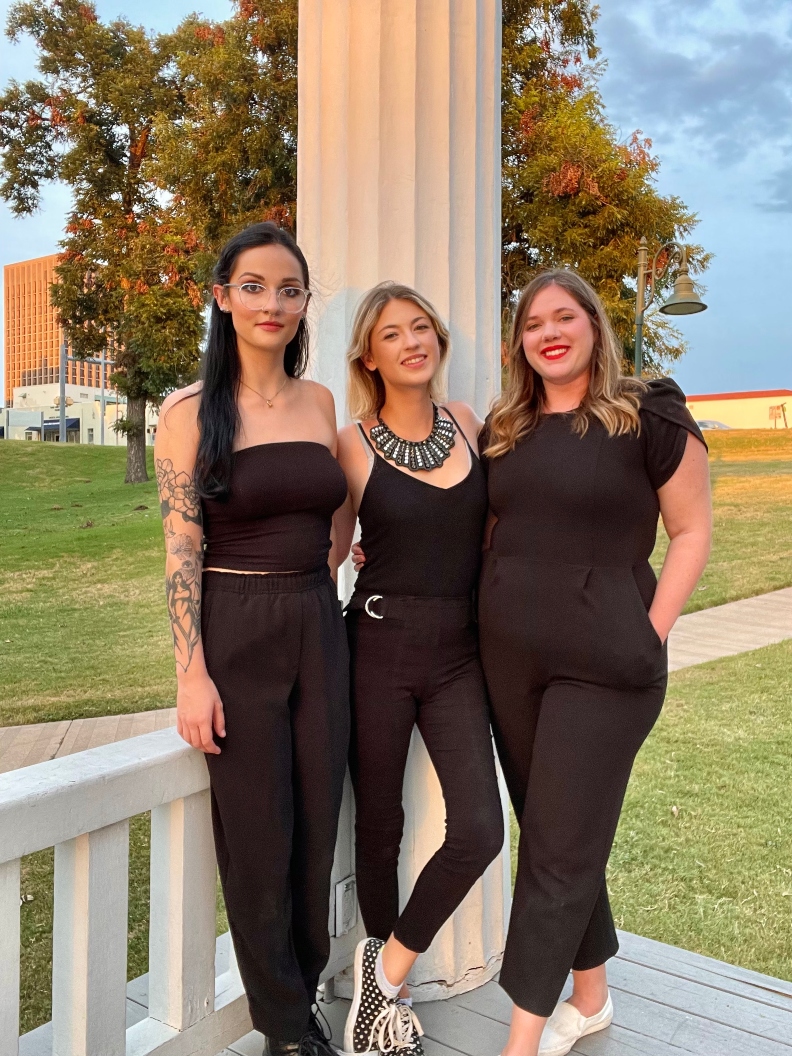
Lauryn About Mady and Anna
“These two have been dealt some of the shittiest hands I’ve seen, and they still wake up everyday and keep going. They’re just always ready to advocate for whoever’s being affected. It amazes me that they still march, that they send me pictures of them in Handmaids costumes. Or like Mady screaming into her megaphone at some small white man. I feel like my ovaries radiate power when I see pictures from them. It’s so empowering. These women are multiple years younger than me, and they’ll still kick my ass out of bed and wake me up if I don’t see things. You two are amazing women, and I hope you know that. I’m just proud of y’all.”
Anna About Mady and Lauryn
“I don’t think Lauryn gives herself enough credit for everything she does and how supportive she is of Anna and I. I think Lauryn and Anna are both the absolute epitome of survivors. We all are. If you’re a woman in Texas, you’re a survivor right now. I couldn’t think of two better examples of love and perseverance. Lauryn is always kicking ass in her career and always has a new project. Not only that, she’s now five years cancer-free. I definitely cried when she sent me that text message. Same with Anna. She wakes up everyday and works her ass off just to make ends meet and just be a young person in this economy, post-grad in the pandemic. It’s hard, but everyday she does it regardless. I’m so proud of both of them.”
Mady About Anna and Lauryn
“Lauryn is more than like a mom. She’s such a kind friend. She’s one of the most thoughtful people I’ve ever met. She’s helped me navigate being an adult. I really appreciate that she’ll give her knowledge because so many people will say, ‘I had to go through this on my own, so figure it out.’ But she always says, ‘This happened to me, and I don’t want you to make the same mistake.’ And surviving cancer at such a young age! Amazing. I’ve seen both of these women survive so much brutality and have had horrible things said to them.
“I’ve seen Mady give her middle finger to the people who were calling her names. Another thing about Mady that I admire is that she’s such a good advocate. If she thinks anyone is being wronged, she will go bananas. Especially after going through endometriosis and going through the health care system. It’s very inspirational for her to be that advocate for her friends and other people. I just think they’re both such amazing women.”
What do you believe makes you powerful?
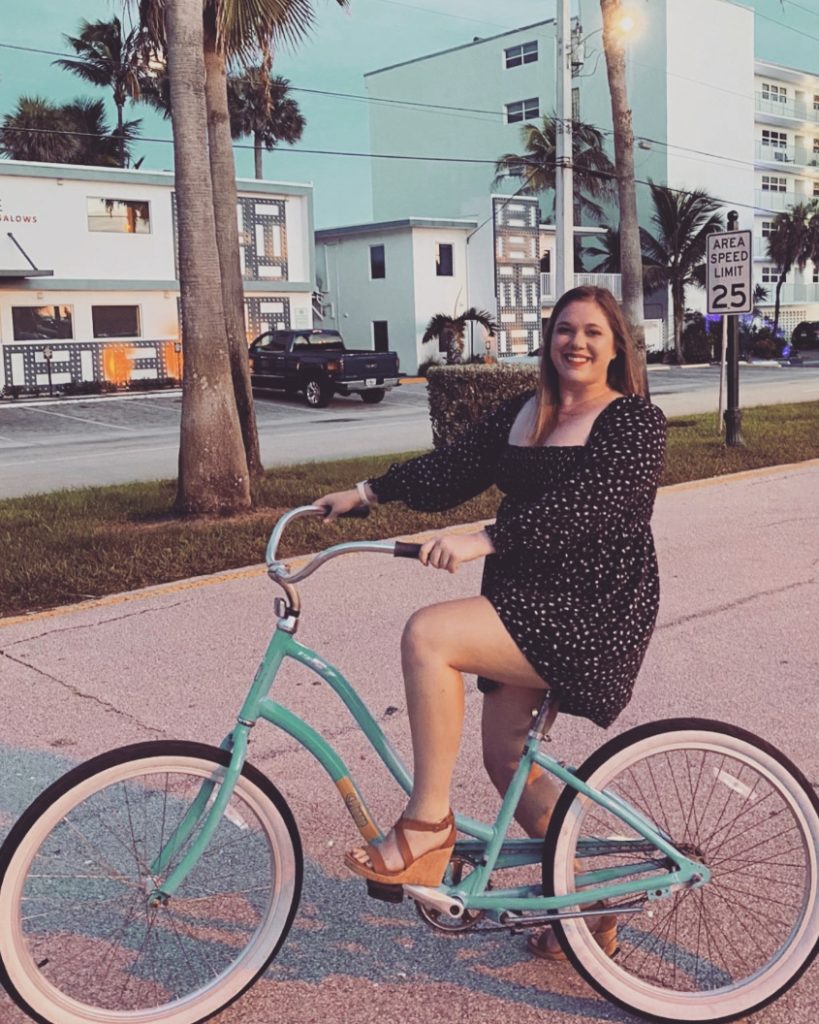
Lauryn
“Something that makes me feel powerful that I’ve seen through my life through all kinds of struggles is resilience. I do feel like I was born with a lot of resilience. I may have to temporarily pause, process and reset. But I always come out stronger no matter what it is. I feel like there’s nothing that’s ever fully gonna stop my drive or stop my soul from singing and screaming. I don’t know if it’s from being sick as a kid to being sick in my 20s to going through all kinds of struggles, I just have always been resilient.
“I’m grateful for that. Just women supporting me makes me feel really powerful. That is feminism, isn’t it? It’s not just about marches and protesting. It’s about paying attention to the women in your life and seeing their struggle and seeing when they need uplifting. Making sure they know that they’re powerful too.”
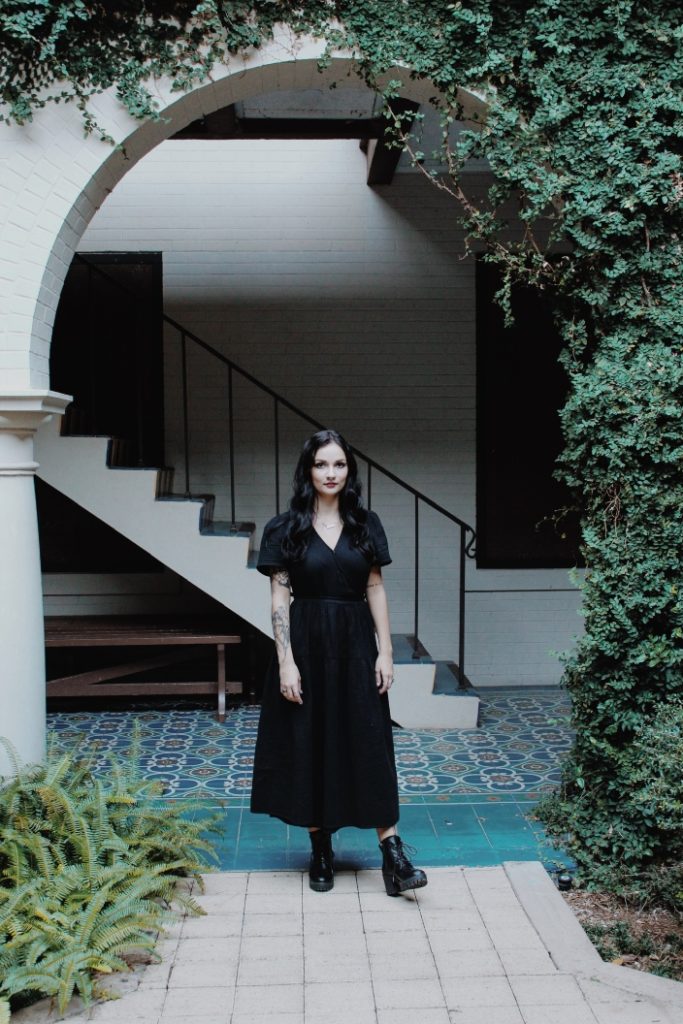
Anna
“The first thing I thought of also was the word ‘resilient.’ I’m 22. Growing up I never thought I’d make it this far. I was always a very depressed and anxious kid, and I could never picture myself as an adult and having a normal life. But, like, I’m living in Austin with a roommate, I have a job, I help raise pugs. I never thought I would be healthy enough or stable enough or a good enough person to make it this far to have friends as great as these two. I guess I’m proud of myself making it this far and surviving.”

Mady
“I find most of my power in my voice, whether that’s actively speaking or writing on my Instagram or my blog. I found that when my body is completely down for the count and I can’t do anything and I feel stuck and I feel trapped, like I can’t go anywhere or do anything I still have my voice, I still have my words. I still have my story. You can be the most confident person in the entire world. You can put on a front, be loud and proud. But at the end of the day, you still have those low moments, you still have those low self-esteem days or low body-image days. Feeling like [I’m] not doing enough a lot of the time is what I feel.
“But I found that the power that I have over my own story and my own voice is really what drives me to keep going more than anything else.”

